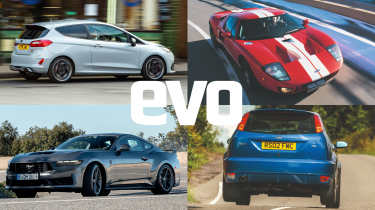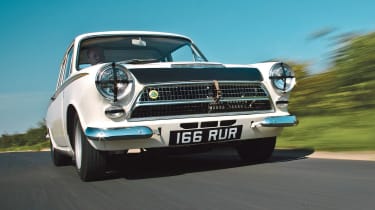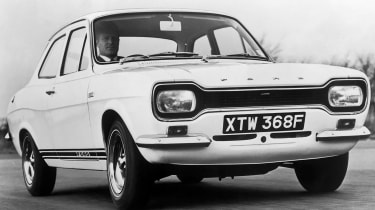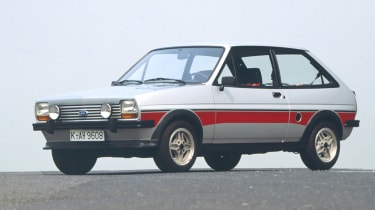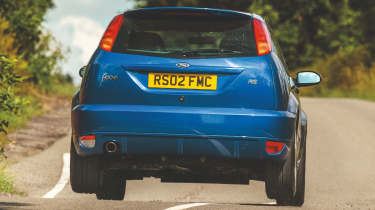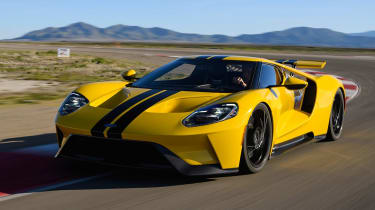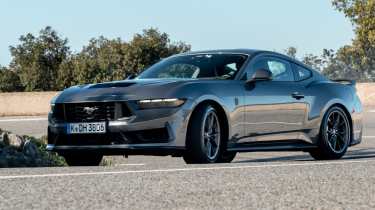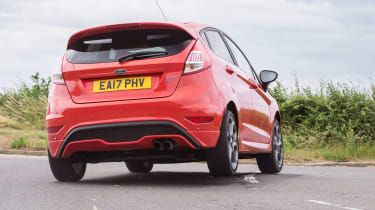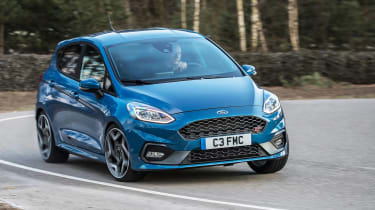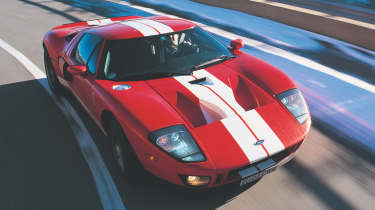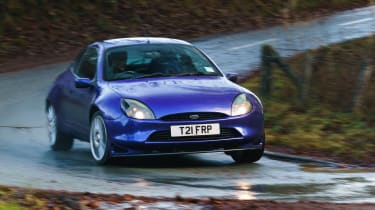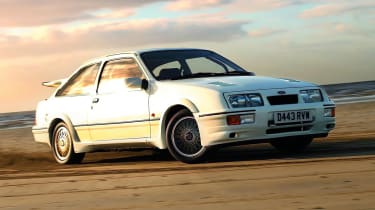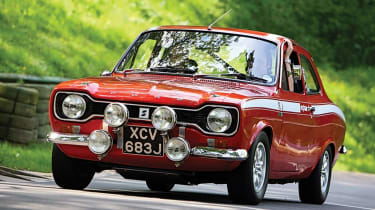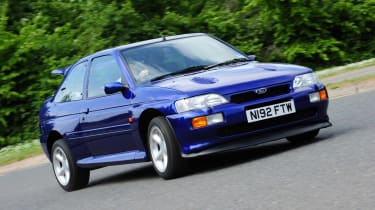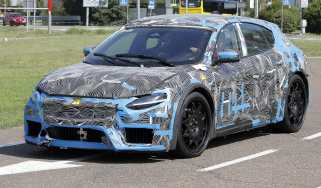Best fast Fords of all time – from the GT supercar to the Fiesta ST
Ford has produced some of our favourite driving machines over its extensive history, these are the best fast Fords from the ages
With a fiercely passionate/tribal fanbase around the world, there really is a fast Ford to tickle all tastes. They’re cars with attitude, that almost always deliver thrills to match their puffed-up looks. They’re not all touring cars or rally cars for the road either, with Ford’s performance car resumé punctuated by supercars and sports cars as well as hot hatches and roided-out repmobiles.
From the 1963 Lotus Cortina Mk1 to the very latest Ford Mustang Dark Horse, via every generation of the Ford GT supercar, the original Focus RS and more, we celebrate the Blue Oval’s greatest performance offerings with a list of our top ten favourites.
Backed up by motorsport success across the continents, and a fiercely passionate base of enthusiasts to draw from, it’s unsurprising to see that Ford’s back catalogue of performance models is vast, and one with perhaps more variety than any other.
From the 1963 Lotus Cortina Mk1 to the modern-day Mustang, and through to the latest iteration of the Ford GT, we celebrate the marque’s greatest performance offerings with our top ten list of favourites.
The best fast Fords of all time
Ford Mk1 Lotus Cortina
Famously photographed in neat, finely balanced high-speed four-wheel drifts – with the likes of Jim Clark, Graham Hill, Jackie Stewart, Jack Sears and Roger Clark behind the wheel – the Lotus Cortina established Colin Chapman and Lotus as the ‘go to’ guys for competition tuning of everyday cars.
With its (Lotus engineer) Harry Mundy-designed and Grand Prix-proven twin-cam cylinder-head under the bonnet, plus lightweight panels and heavily revised suspension, the ‘Consul Cortina Developed by Lotus’ helped Jim Clark win the 1964 BRSCC Saloon Car Championship, then bagged the European Saloon Car Championship for Sir John Whitmore the year after. Victory on the 1966 RAC Rally showed it was robust as well as quick.
Ford Escort Twin-Cam
The Escort Twin Cam’s genesis sprang from a ‘what if?’ moment within Ford’s rally team: What if we stuff the running gear from the Lotus Cortina into the lighter bodyshell of the Escort? A good question with a very satisfactory answer.
As a rally car the Twin Cam won the World Championship for Makes in 1968 and 1969, and with its engine further tuned by Cosworth, the Twin Cam also took the 1968 British Saloon Car Championship too.
Ford Fiesta Supersport
The Supersport wasn’t technically the first sporting Fiesta – that was the 1300 Sport – but it was very much the precursor to the XR2 that followed in the second generation.
With 89bhp from its 1.3-litre engine and a 775kg kerb weight it was certainly lively by the standards of early 1980s shopping cars, and like the XR2 the styling still looks great today – think stripes, spotlights, chunky 13x6in alloy wheels, and a matching front lip and tailgate spoiler. Values today are rising rapidly for the rare survivors, too.
Ford Focus RS Mk1 (2002)
At the time of its release the first Ford Focus RS divided opinion as aggressively as it divided its torque between the front wheels with its trick Quaife limited-slip differential. It was no rally car for the road, in spite of the styling links with McRae’s stage-monstering weapon. But it was rough around the edges – an unruly thing, if you weren’t in the right mood, on the right bit of road, applying the right technique. You had to be careful how you metered out its substantial-then, modest-today 212bhp output from its 2-litre turbocharged engine. It was positively hyperactive, with a nose so darty that sometimes the rest of the car couldn’t keep up. evo testers also found some variation in feel between cars, with the potential for one Focus RS to feel really quite different from another.
All that meant the RS irritated some on launch, with many preferring the better-rounded ST170 warm hatch. In today’s world and its dwindling hot hatch market of perfectly polished supercar-slayers, however, the pub car park brawler that is the first Focus RS has a welcome slathering of character you just don’t see anymore.
Ford GT (2017)
The road-going Ford GT and GT40 has always had an extremely close relationship to its competition sibling (the 2005 reincarnation not included), but the connection has never been so direct than with Ford’s second-generation GT. Just three years after the project’s inception, the Le Mans racer went on to claim the GTE Pro victory at the 2016 Le Mans 24hr.
Assembled by Multimatic, the second-generation GT was designed first as an endurance racer, and it shows in the road-car. After extending the production run due to unprecedented demand, the road-going GT is still in production today, where its truly unique driving experience is as close as you can get to driving a Le Mans-winning racer on the roads.
Ford Mustang Dark Horse
Ford’s been getting very serious with the Mustang for the better part of a decade now. The first signs of life in the age-old pony car as a true driver’s option were in the 2011 Boss 302. Then the ‘global’ Mustang arrived in 2014, still with the V8 but dynamics honed to European sensibilities. Then the US-only GT350 with its screaming ‘Voodoo’ V8 absolutely blew us all away. For 2021, the Mach 1 brought some of that intensity to a Mustang available to UK buyers and now, the Dark Horse feels like the conclusion of that journey. The Mach 1 was already good enough to be on this list but the Dark Horse has more responsive steering and finer-honed MagneRide damping among its range of better-practised talents.
In the words of evo deputy editor James Taylor, ‘Even if its styling looks a little fussier than that of its predecessor to these eyes, and even if the similarly priced BMW M2 is objectively the better buy, there’s nothing else out there quite like it. It’s likely one of the very last manual V8 cars available to buy – but that’s not the only thing the new Mustang has going for it.’
There is an important caveat, however. The US-spec Dark Horse, with the full 500bhp power offering and the option of the camber-tastic, Trofeo RS-tyred Handling Pack, is what lends it a spot on this list. UK cars are somewhat watered down, thanks to emissions regulations and EU rules to which the Handling Pack-equipped cars do not comply. A shame that the ultimate driver’s Mustang is once again, a Mustang European buyers can only dream about, or pay through the nose to import…
Ford Fiesta ST Mk7
The Mk7 Fiesta ST was an outstanding hot hatch, with class-leading dynamics and a little firecracker of a 180bhp turbocharged four-cylinder engine. Defined on the road by its almost comically tail-happy handling balance, superb body control and its screaming engine, it was simply unmatched at the time of its launch.
That engine was a 1.6-litre turbocharged four-pot under the VCT designation, and in all ST forms had a fantastic propensity to rev, and rev without a hint of strain as it flung itself into the redline. It’s 180bhp was then sent to the front wheels via a six-speed manual gearbox for a 6.9sec 0-62mph time and 139mph top speed. It might have lacked the hardware of some contemporary rivals, like the limited-slip differential and sticky tyres of rivals like the Peugeot 208 GTI by PS, but the ST’s joyful driving experience was all the better for it, bringing world-class performance car experiences to the masses for an even more affordable price.
Ford Fiesta ST Mk8
Bettering the Mk7 seemed a near-impossible task, but the boffins at Ford Performance managed to pull it off with the Fiesta ST that followed. Thanks to new hardware like the limited-slip differential and a faster progressive steering, front end bite is superb. This is balanced by a mobile and interactive rear-end and a feeling of depth to the engineering that Ford’s engineers have become known for.
Ride is firm, but it also keeps the body composed over difficult sections of tarmac, while not being so iron-fisted to become unpredictable as speeds rise. The real difference between it and the previous mk7 is the powertrain though, as while the new 1.5-litre three-cylinder has more punch, it lacks the previous engine’s willingness and enthusiasm. Still, with 197bhp and 214lb ft of torque, the St is good for a 6.5sec 0-62mph time and 144mph top speed, once again bringing performance to the masses like few others. It's such a shame the Fiesta ST is now no longer with us.
Ford GT (2005)
Doubters were aplenty when Ford announced it would take on Ferrari with a new supercar. Could this North American monolith produce something with the finesse, quality and desirability required of a pretender to Maranello’s crown?
The GT40-inspired Ford GT faced an uphill battle against expectations on its debut but largely the answer, to the overjoyed surprise of all who drove it, was yes. Firstly, it was beautiful, reinterpreting the inimitable silhouette of Ford’s 1960s Le Mans star perfectly for the modern world. Secondly, its performance was dramatically potent. For a car benchmarked against the Ferrari 360 Modena, 550bhp from the Ford’s 5.4-litre supercharged V8 was, er, overkill. It was truly supercar-quick, capable of 0-62mph in 3.7 seconds on the way to a 205mph top speed.
But the genius of the GT lies not on the spec sheet, or in those Le Mans-inspired lines. It’s in the driving. This is a car that’s almost as fast as some hypercars that drives like a well-honed sports car, with an approachable and manipulable yet thrilling chassis. Its touch points are user-friendly yet satisfying and high-quality, from the steering to the gear shift and clutch action. Described as the ‘550bhp Elise’ by Peter Tomalin during 2005’s evo Car of the Year, it’s small wonder it thundered away with the crown. Small wonder it claimed a spot in evo’s list of the top 25 cars of the last 25 years in the magazine’s anniversary issue, too.
Ford Racing Puma
Just two years after its launch came the Racing Puma, an even more bespoke and specialised limited edition that has since gone on to define the term affordable exotic. The differences are immediately obvious, with a set of motorsport-inspired 17" Speedline wheels tucked within widened arches, adding 70mm and 90mm of additional track with front and rear. New bumpers and larger Alcon brakes were also part of the package, with the cabin also receiving an overhaul with the addition of that trademark blue Alcantara trim and Sparco bucket seats.
Various tweaks to the 1.7-litre engine added a further 30bhp on the table for a total of 153bhp – torque only saw a mild bump to 119lb ft. Despite an increase in weight over the standard car, a 132bhp/ton power-to-weight ratio gave it a 7.9sec 0-62mph time, but the Racing Puma was never about straight-line speed, rather the ability to handle twisty broken back roads like few others.
Sierra RS500 Cosworth
The Ford Sierra Cosworth was designed from the outset as a homologation special for touring car racing, but while the road car created a passionate following by fans, the racer wasn’t quite so successful. To fix that, Ford went to Aston Martin Tickford racing to build a special edition called the Sierra RS500 Cosworth, which featured a selection of updates that would build on both the road car and its racing sibling.
The changes consisted of a new front bumper and grill to feed more air to the new, bigger turbo, larger intercooler and oil cooler. The race version also received a different set of injectors, helping liberate over 400bhp from its Cosworth YBD engine, a big jump on the road-going model’s 224bhp. The RS500 proved the success on track that Ford was hoping for, in the process creating an icon out of the 500 homologation road cars.
Escort Mexico Mk1
The Mk1 Escort Mexico might not have had 'RS' in its name but it had all the credentials to make for one of Ford’s most iconic performance models. It was built to celebrate Ford’s victory of the 1970 London to Mexico rally, hence the iconic name. Its stiffer shell, improved suspension and heavy-duty transmission were shared with the RS1600 and built by Ford's AVO (Advanced Vehicle Operations) department.
It made do with Ford's 1.6-litre 'Crossflow' engine from the Cortina and Capri – developing 85bhp at 5500rpm – but that made it strong, durable and easy to maintain. Ideal characteristics for winning a long-distance rally.
Escort RS Cosworth
In the 1990s, there were one or two crucial elements that defined success in the world rally championship, and one of those things was four-wheel drive. In order to compete with the hugely successful Lancia Delta Integrale and Toyota Celica, Ford had to go the extra mile of developing its rally car from scratch, creating the iconic Escort RS Cosworth we know and love.
While it might have looked like a contemporary front-wheel drive Escort of the ‘90s, it was in fact based mechanically on the earlier 4WD Sierra Sapphire Cosworth featuring an updated 2.0 four cylinder turbocharged Cosworth engine, developing 217bhp. The body of the MK5 Escort was then modified with wide arches, deeper sills and bumpers, and the now iconic rear wing. Ironically, the Escort RS Cosworth rally car never won a title – but still won eight rounds of the WRC in Group A specification, and then twice more under new WRC car regulations.
